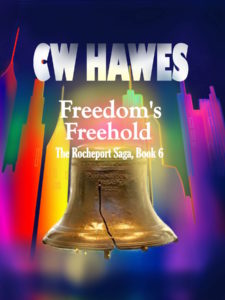Lately I’ve been reading post-apocalyptic literature (among other things). Reading how other writers envision the future when humanity has a chance to start over is always interesting, for it reveals how these writers see themselves and their fellows.
One of my first published books was The Morning Star, the first book in The Rocheport Saga. The Saga is the autobiography, as it were, of Bill Arthur, who is a survivor of an unknown plague that wiped out most of earth’s human population. He begins to gather together other survivors in an attempt to reboot civilization. But not the old one that died, a new one that is better.
Much of Bill’s political philosophy is drawn from libertarian writings. The Moon is a Harsh Mistress being one. So I thought I’d re-post one of my writings from the very early days of this blog. Let’s look once again at Rational Anarchism. Enjoy!
Nearly fifty years ago, a writer by the name of Robert A Heinlein wrote and got published a book entitled, The Moon is a Harsh Mistress. One of the principal characters in the novel is Professor Bernardo de la Paz, who describes himself as a “Rational Anarchist”.
What is a Rational Anarchist? Let’s take a look, because the words rational and anarchy seem to be contradictory. A Rational Anarchist:
-
- Believes the state, society, and government are concepts which do not exist apart from the physical acts of self-answerable individuals.
- Believes blame, guilt, responsibility, and answerability makes it impossible for a person to shift, share, or distribute blame.
- Being rational, the rational anarchist understands not everyone shares his or her views; yet, he or she strives to live perfectly in an imperfect world; completely aware he or she is not capable of achieving perfection.
- Accepts all rules society deems necessary to secure its freedom and liberty.
- Is free no matter what the rules are in his or her society. If the rules are tolerable, he or she will tolerate them. If not, the rational anarchist will break them.
- Is free because the rational anarchist knows only he or she is morally responsible for everything he or she does.
Why do I bring this up? Because Bill Arthur in The Rocheport Saga tries to create a new world along similar lines. He begins as an anarchistic libertarian, seeking on a societal level to create the ultimate environment for freedom. Eventually he realizes people are people. Even after a calamity which wipes out 98 out of every 100 people, those who survive haven’t essentially changed. The survivors are no different than they were before they were survivors. People want freedom, but actually crave security and will sacrifice freedom for security every time they feel insecure.
In the end, Bill Arthur becomes a Rational Anarchist. He concludes the Stoics were right over 2,000 years ago: all we can ultimately do is control ourselves.
Tell me what you think about freedom and security. Is Bill Arthur right?
Share This!